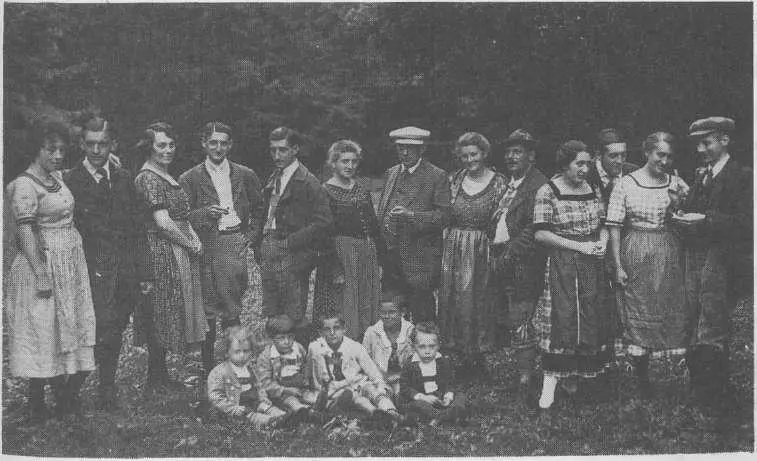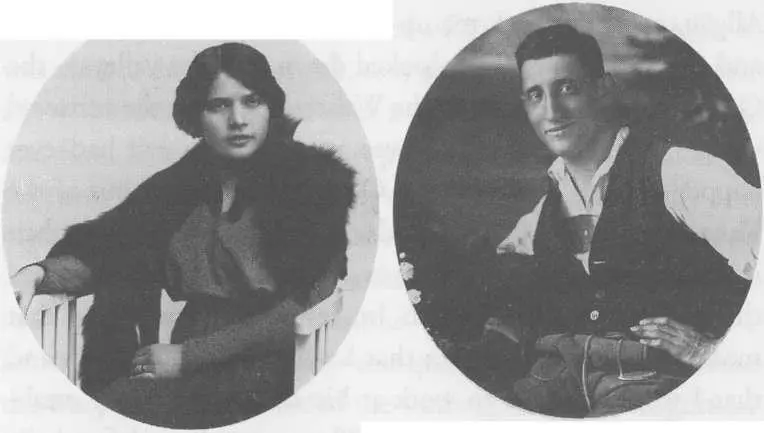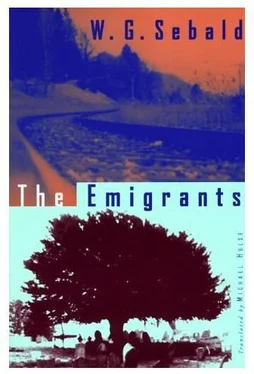I spent the years which followed that summer in the usual way, doing my household duties, handling the accounts and correspondence in the stables and provisioning business, and waiting for the Viennese horn player to return to Kissingen, which he did regularly, together with the swallows. Over the nine months of separation each year we always grew apart somewhat, despite the many letters we wrote, and so it took Fritz, who like myself was essentially an undemonstrative person, a long time before he proposed to me. It was just before the end of the 1913 season, on a September afternoon that trembled with limpid loveliness. We were sitting by the salt-frames and I was eating bilberries with sour cream from a china bowl, when suddenly Fritz, in the middle of a carefully worked out reminiscence of our first outing to Bodenlaube, broke off and asked me, without further ado, if I should like to marry him. I did not know what to reply, but I nodded, and, though everything else around me blurred, I saw that long-forgotten Russian boy as clearly as anything, leaping about the meadows with his butterfly net; I saw him as a messenger of joy, returning from that distant summer day to open his specimen box and release the most beautiful red admirals, peacock butterflies, brimstones and tortoiseshells to signal my final liberation. Father, however, was reluctant to agree to a speedy engagement. He was not only troubled by the rather uncertain prospects of a French horn player, but also claimed that the proposed attachment was bound to cut me off from the Jewish faith. In the end it was not so much my own petitioning as the unceasing diplomatic efforts of Mother, who was not so concerned about upholding our traditional life, that won the day; and the following May, on my and Leo's twenty-fifth birthday, we celebrated our engagement at a small family gathering. A few months later, however, my dearest Fritz, who had been called up into the Austrian Musicians' Corps and transferred to Lemberg, suffered a stroke in the midst of playing the Freischutz overture for the garrison's., officers, and fell lifeless from his chair. His death was described to me a few days later in a telegram of condolence from Vienna, and for weeks the words and letters danced before my eyes in all sorts of new combinations. I really cannot say how I went on living, or how I got over the terrible pain of parting that tormented me day and night after Fritz's death, or indeed whether I have ever got over it. At all events, throughout the war I worked as a nurse with Dr Kosilowski. All the spa buildings and sanatoria in Kissingen were full of the wounded and the convalescent. Whenever a new arrival reminded me of Fritz, in appearance or manner, I would be overwhelmed afresh by my tragedy, and that may be why I looked after those young men so well, some of whom were very seriously injured — as if by doing so I might still save the life of my horn player. In May 1917 a contingent of badly wounded artillerymen was brought in, among them a lieutenant whose eyes were bandaged up. His name was Friedrich Frohmann, and I would sit at his bedside long after my duties were over, expecting some kind of a miracle. It was several months before he could open his seared eyes again. As I had guessed, they were Fritz's greyish-green eyes; but extinguished and blind. At Friedrich's request we soon began to play chess, describing the moves we had made or wanted to make in words — bishop to d6, rook to f"4, and so on. By an extraordinary feat of memory, Friedrich was soon able to retain the most complex games; and if his memory did fail him, he resorted to his sense of touch. Whenever his fingers moved across the pieces, with a delicate care that I found devastating, I was always reminded of the fingers of my horn player moving upon the keys of his instrument. As the year neared its end, Friedrich came down with some unidentifiable infection and died of it within a fortnight. It was almost the death of me, too, as they later told me. I lost all my beautiful hair and over a quarter of my body weight, and for a long time I lay in a profound, ebbing and flowing delirium in which all I saw was Fritz and Friedrich, and myself, alone, separate from the two of them. To what it was that I owed thanks for my utterly unexpected recovery late that winter, or whether "thanks" is at all the right word, I know as little as I know how one gets through this life. Before the war's end I was awarded the Ludwig Cross in recognition of what they called my self-sacrificing devotion to duty. And then one day the war really was over. The troops came home. The revolution broke out in Munich. The Freikorps soldiers gathered their forces in Bamberg. Eisner was assassinated by Anton Arco Valley. Munich was re-taken and martial law was imposed. Landauer was killed, young Egelhofer and Leviné were shot, and Toller was locked up in a fortress. When everything was finally back to normal and it was business more or less as usual, my parents decided that now was the time to find me a husband, to take my mind off things. Before long, a Jewish marriage broker from Wiirzburg by the name of Brisacher introduced my present husband, Fritz Ferber, to our home. He came from a Munich family of livestock traders, but was himself just in the process of setting himself up in middle-class life as a dealer in fine art. Initially I consented to become engaged to Fritz Ferber solely because of his name, though later I did come to esteem and love him more with every day. Like the horn player before him, Fritz Ferber liked to take long walks out of town, and, again like him, he was by nature shy but essentially cheerful. In the summer of 1921, soon after our marriage, we went to the Allgàu, and Fritz took me up the Ifen, the Himmelsschrofen and the Hohes Licht. We looked down into the valleys — the Ostrachtal, the Illertal and the Walsertal — where the scattered villages were so peaceful it was as if nothing evil had ever happened anywhere on earth. Once, from the summit of the Kanzelwand, we watched a bad storm far below us, and when it had passed the green meadows gleamed in the sunshine and the forests steamed like an immense laundry. From that moment I knew for certain that I was now Fritz Ferber's and that I would be glad to work at his side in the newly established Munich picture gallery. When we returned from the Allgäu we moved into the house in Sternwartstrasse where we still live. It was a radiant autumn, and a hard winter to follow. True, it did not snow much, but for weeks on end the Englischer Garten was a miracle of hoar frost such as I had never seen, and on the Theresienwiese they opened up an ice-rink for the first time since the outbreak of war, where Fritz and I would skate in wonderful, sweeping curves, he in his green jacket and I in my fur-trimmed coat. When I think


back to those days, I see shades of blue everywhere — a single empty space, stretching out into the twilight of late afternoon, crisscrossed by the tracks of ice-skaters long vanished.
The memoirs of Luisa Lanzberg have been very much on my mind since Ferber handed them over to me, so much so that in late June 19911 felt I should make the journey to Kissingen and Steinach. I travelled via Amsterdam, Cologne and Frankfurt, and had to change a number of times, and sit out lengthy waits in the Aschaffenburg and Gemünden station buffets, before I reached my destination. With every change the trains were slower and shorter, till at last, on the stretch from Gemünden to Kissingen, I found myself in a train (if that is the right word) that consisted only of an engine and a single carriage — something I had not thought possible. Directly across from me, even though there were plenty of seats free, a fat, square-headed man of perhaps fifty had plumped himself down. His face was flushed and blotched with red, and his eyes were very close-set and slightly squint. Puffing noisily, he dug his unshapely tongue, still caked with bits of food, around his half-open mouth. There he sat, legs apart, his stomach and gut stuffed horribly into summer shorts. I could not say whether the physical and mental deformity of my fellow-passenger was the result of long psychiatric confinement, some innate debility, or simply beer-drinking and eating between meals. To my considerable relief the monster got out at the first stop after Gemtinden, leaving me quite alone in the carriage but for an old woman on the other side of the aisle who was eating an apple so big that the full hour it took till we reached Kissingen was barely enough for her to finish it. The train followed the bends of the river, through the grassy valley. Hills and woods passed slowly, the shadows of evening settled upon the countryside, and the old woman went on dividing up the apple, slice by slice, with the penknife she held open in her hand, nibbling the pieces, and spitting out the peel onto a paper napkin in her lap. At Kissingen there was only one single taxi in the deserted street outside the station. In answer to my question, the driver told me that at that hour the spa clientèle were already tucked up in bed. The hotel he drove me to had just been completely renovated in the neo-imperial style which is now inexorably taking hold throughout Germany and which discreetly covers up with light shades of green and gold leaf the lapses of taste committed in the postwar years. The lobby was as deserted as the station forecourt. The woman at reception, who had something of the mother superior about her, sized me up as if she were expecting me to disturb the peace, and when I got into the lift I found myself facing a weird old couple who stared at me with undisguised hostility, if not horror. The woman was holding a small plate in her claw-like hands, with a few slices of wurst on it. I naturally assumed that they had a dog in their room, but the next morning, when I saw them take up two tubs of raspberry yoghurt and something from the breakfast bar that they had wrapped in a napkin, I realized that their supplies were intended not for some putative dog but for themselves.
Читать дальше














